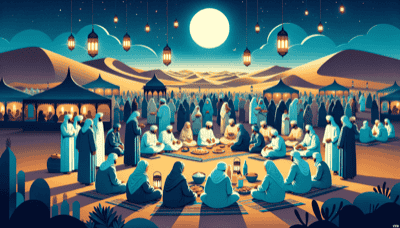We're here to help you keep count of the days to or since a date. Just click the button below and enter your chosen date to get started. Also choose the suggested days or search for a special day above #countingthedays

Eid al-Fitr, known as Aïd el-Fitr in Algeria, marks the end of Ramadan, the Islamic holy month of fasting. It is one of the most significant religious events for Muslims worldwide.
The history of Eid al-Fitr dates back to 624 CE when the Prophet Muhammad received revelations from Allah that formed the Quran. To celebrate the conclusion of Ramadan, which commemorates the first revelation, Eid al-Fitr was established as a day of feasting and gratitude to Allah for providing strength throughout the fasting period.
On this day, Algerians engage in various traditions to celebrate:
Early Morning Prayer: The day begins with a special prayer called Salat al-Eid performed in mosques or large open spaces.
Zakat al-Fitr (Charity): Before the Eid prayers, Muslims are required to give charity on behalf of each family member, known as Zakat al-Fitr or Fitrana, intended to purify those who fast from any indecent act or speech and to help the poor and needy.
Feasting: After prayers, families gather for a festive meal that often includes traditional dishes like couscous, chakhchoukha (a dish made with pasta and stew), sweets such as baklava and maqrout (date-filled cookies).
New Clothes: It's customary for people to wear new clothes symbolizing renewal and purity.
Visiting Friends and Family: Algerians visit relatives and friends throughout the day to share food and gifts. It is a time for socializing and showing unity within the community.
Children's Joy: Children usually receive Eidiyah (money) from elders as a gift on this occasion.
On Eid day itself:
In essence, Eid al-Fitr in Algeria is characterized by communal prayers, acts of charity towards the less fortunate, joyful gatherings